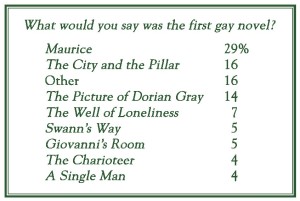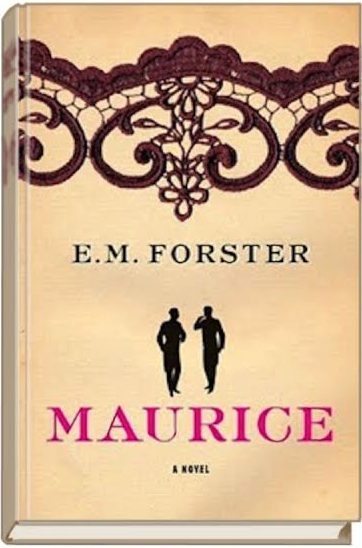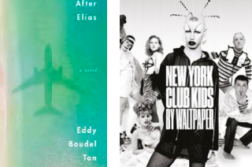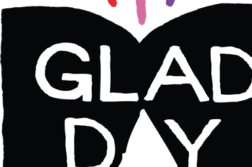
THE RESULTS ARE IN! We asked you to cast your vote for “the first gay novel” – which is the theme of the new issue of The GLR. We offered the eight choices that are discussed in this issue, and also invited you to add a different book if your preference was not included.
We received around sixty responses, and the clear winner was E. M. Forster’s Maurice (1971). In second place was Gore Vidal’s The City and the Pillar (1948), followed closely by Oscar Wilde’s The Picture of Dorian Gray (1890). Actually, “Other” tied for second place.
Interestingly enough, all of the nominees received at least some votes. Rounding out the roster were: The Well of Loneliness, by Radclyffe Hall (1928); Proust’s In Search of Lost Time (1920s in English); James Baldwin’s Giovanni’s Room (1956); Mary Renault’s The Charioteer (1953); and Isherwood’s A Single Man (1964). (See chart.)
As always in surveys of this kind, some of the most interesting responses came from those who didn’t find their selection on our list. Among the books they nominated were Homer’s Iliad and Petronius’ Satyricon from ancient times, which gets us into the definition of a “novel.” One reader thought something by the Marquis de Sade should have been included. Another book that preceded our lineup was Bayard Taylor’s Joseph and His Friend: A Story of Pennsylvania, published in 1870, with the additional subtitle of “The First Gay Novel” in a recent edition. Nominees from the 20th century included Better Angel, by Ralph Meeker (1933); Sam: A Frank Novel of Life and Loves in a Strange Twilight World, by Lonnie Coleman (1959); and John Rechy’s City of Night (1963).
Comments on “Other” Nominees included the following:
The Satyricon, by Petronius. “It would seem to me ‘the first’ means the first, which surely refers to date? Is that a semantic quibble or what? The first gay novel I know of is from the late first century AD as The Satyricon, by Gaius Petronius.”
Bayard Taylor’s Joseph and his Friend. “Published in 1870, before any of the others and a lot gayer, too, than the earliest on your list. Not today’s style, not well known, but there it is, a definite gay novel.”
Better Angel, by Ralph Meeker. “The Young and The Evil was also published in 1933 but is more queer than gay.”
Lonnie Coleman’s Sam. “I was fifteen when I read it. It was a paperback for thirty-five cents. I saw it in a bookstore here in Seattle a few years ago in a vintage collection for about twenty dollars. I didn’t buy it. I should have. So that was my first gay novel.”
Comments on the Eight Nominees spotlighted in the current issue included these:
On Oscar Wilde’s The Picture of Dorian Gray:
“Dorian’s exploits are full of dark unspecified atrocities which, though not clearly stated (unless you read the more recent unexpurgated version, which has been fully restored), are veiled and coded for queer sensibilities.”
On E. M. Forster’s Maurice:
“Although not published until Forster’s death, this is the first openly gay novel on the list and the first book to describe homosexuality as a way of being in the 20th century.”
“For me, Maurice is the first novel about explicitly romantic and sexual same-sex relationships. Dorian Gray, as much as I love the book, is veiled so thickly in the gauze of Victorian innuendo that, even in the unexpurgated version released last year by Harvard University Press, we have to read between the lines.”
“Although it was only published in 1971, Maurice was originally written in 1913. The author resisted publication because he feared reaction to the same-sex content. A hundred years later, we now are able to celebrate our relationships and marriages, something Forster could not imagine at the time.”
“It was the first one written specifically with gay characters.”
On Marcel Proust’s In Search of Lost Time
“It’s taken a long time for Proust’s world to traverse the journey from great literary classic to major work of ‘gay’ fiction. But it’s an inherently ‘gay’ quantum in terms of the aesthetics obsessively doted upon and the shear scope of ambition. Framing it in terms of a gay subject actually increases penetration and understanding of the text and characters rather than causing a shallowness of view.”
On Radclyffe Hall’s The Well of Loneliness
“I think Hall was writing about, and for, all of us.”
“Surely the earliest and most love-driven novel ever written in the genre. Daring, tender, and informative. I was 12 when I read it—and cried buckets. I am now 80 and have just been given the right to marry my ‘partner’ of 40+ years. I have been gifted with being alive and aware during this era of profound change.”
“Even though I am a gay man (now 76), when I read this in the early 1950s, I was thrilled to find women and men who were like myself who were neither criminals nor mentally ill. Those were the choices with which I thought I would have to face life in 1954.”
On Gore Vidal’s The City and the Pillar:
“I selected The City and the Pillar because there were no ambiguities about what the book was exploring: homosexual longing, love, and rejection. Any of the earlier books were indirect about the topic, and the others followed Vidal’s book.”
“Vidal is one of the few openly gay writers I knew about during my early years of exploration and learning who I really was. His legacy is stellar.”
On Mary Renault’s The Charioteer:
“All her historical novels opened a window of homo-eroticism to this teen-age boy struggling with his own identity. I was an avid reader.”
On James Baldwin’s Giovanni’s Room:
“This novel strikes a resounding chord of hope for those of us resisting suffocation in a web of oppression.”
On Christopher Isherwood’s A Single Man
“I still recall buying it in La Crosse, Wisconsin, a half hour away from the liberal arts college I was attending in Minnesota the year it came out. I was young then and had far more questions than I did answers. I recall the illuminating details and the wonder and lust it created in me. All those memories were renewed when the motion picture of A Single Man came out recently.”
“I also think it’s the best gay novel.”
We plan to ask the same question again in our next newsletter to see if the results change after you’ve had a chance to read the current issue. There’s a lot of material there — happy reading!







Discussion6 Comments
No John Rechy: CITY OF NIGHT! No Jean Genet: QUERELLE! I’m stunned.
I seem to remember reading a paperback book with the title of “Quatrefoil” and another entitled “Song of the Loon” which were available on newsstands in the late 50’s, and these would have been the first gay novels for many. “Maurice” was not then readily available and neither were most of the other books,
(I missed the first vote/comment period. Apologies if this has been mentioned already.)
I wouldn’t necessarily nominate it for the *first* gay novel, but Bertram Cope’s Year, written by Henry Blake Fuller, and published in 1919, still has a lot to recommend it. From the Publisher’s Weekly review: “The bittersweet core of the narrative, discreetly implied, is the homosexuality of its hero, Edmund Cope… An amusing entertainment in its own right, this novel is also an important discovery for the gay literary canon, particularly (as essayist Andrew Solomon points out in his afterword) for its rare portrayal of day-to-day gay domestic life.”
By illuminating the point of the first gay novel, we may gain a clearer picture of the first gay author. Spanning from across the genres, this may include Whitman and the ancient Greeks. However looking at the whole picture of E.M Fosters novels we also have a nicer portrait of why life especially gay life doesn’t neccesarily have to make sense. It would be just as interesting to showcase all the genre’s including poetry, philosophy, psychology and even religion. To see who set the tone for the rest of the community that was to follow.
I just finished reading “Maurice” to me forster is describing a homosexuality that is somehow caught in the limitations of the common man. That Maurice is a socialist, I would ask what is redeeming about him, other than he is a progenitor with a deeply imbued male depiction of sexual orientation and preference. In reading betwen the lines. I ask if Maurice is about a character who has no use for the exploits of religion in that he feels that only homosexual intercourse creates the essential substance that we all must consider. I found it interesting that his conversion therapy was more of a matter of the seclusion which must have been disabling, as Maurice being worlds apart from any mainstream heterosexuality, must have felt the impediment of a society that was hoping he would change, which he cannot do as we learn.
Seems to me that “Escal-Vigor” (1899), centered around an explicitly gay couple, is the true oldest gay novel. However, the author was Belgian, wrote the book in French and I’m not sure there’s an English translation.